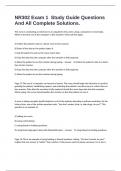Exam (elaborations)
NR302 Exam 1 Study Guide Questions And All Complete Solutions.
- Course
- Institution
The nurse is conducting an interview in an outpatient clinic and is using a computer to record data. Which is the best use of the computer in this situation? Select all that apply. A) Collect the patient's data in a direct, face-to-face manner. B) Enter all the data as the patient states it. C...
[Show more]



